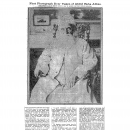Main menu
- ‘Abdu’l-Bahá’s Journey
- World Peace
- Stopping Racism in America
- Empowerment of Women
- More Principles...
- Prayer for America
First Photograph Ever Taken of ‘Abdu’l-Bahá Abbas.
“The Master” of the Bahist faith is now in London and may come to America.
Special Correspondence The New York Times
LONDON, Sept. 16. — ‘Abdu’l-Bahá Abbas, the prophet of the Bahá faith, which in recent years has gained an extraordinary number of adherents in Persia, Europe, and America, especially among the wealthy and cultivated classes, is now in London on his first visit to the West.
The photograph sent herewith is the first ever taken of “The Master.” Previously he had entertained a strong objection to being photographed, and baffled snapshotters by never appearing in the streets, without a little retinue of adherents, who shielded him. His disciples in London, however, at length persuaded him to sit for his portrait.
It was in 1892 that Bahá’u’lláh, the “Báb” — the word means “gate” and is used in the sense of the Hindu “Yogi” — died, and he bade his followers look to his son, ‘Abdu’l-Bahá,” The Master,” for leadership. ‘Abdu’l-Bahá was born in prison, and for forty years lived under the surveillance of the Turkish Government. The Bahá’ís’ confinement at Akka has been described by one who visited them there as a “prison of peace, of love, and service.” Yet the sword of Damocles hung perpetually over the prisoners’ heads. Each visitor was suspected of political intrigue; never a day passed which might not have been the last. But still the faith grew.
“A good Christian, a good Jew, a good Mahommedan; these are Bahá’ís, for the basis of all religion is one,” said Bahá’u’lláh. “No Bahá’í is asked to give up his faith; he is required to make good his faith. There is no need for converts, for the unity is there; men are but asked to recognize it.”
At Akka, many times, men of seven or eight nationalities and religions gathered together at the same table. In 1908 the first Bahá’í came to London.
An English woman Bahá’í thus describes in The Daily Mail ‘Abdu’l-Bahá and his message:
A man of medium height, but striking carriage, with kind, thoughtful eyes, high forehead, clear-cut features, white hair and beard — this is ‘Abdu’l-Bahá. His dress is Eastern, a cream-colored robe covering a linsey frock, a white turban surrounding the Turkish cap. “My words.” he says, “are the seed. I hope it will spring up and be very good.”
There is no need to ask him questions; he speaks what is In his mind: “I am not a prophet. I am the servant of God. I am the lover of mankind, for the Bahá’í religion is universal. I am the shadow of the manifestation” (Bahá’u’lláh.) “There have always been manifestations of God. They have been the principal teachers of mankind. Each time they have come when the world was lost in ignorance. Moses came when Egypt was plunged in darkness. He was the Divine teacher. He brought the Jews to the highest degree of nobility; he gave them a complete civilization. Then little by little it disappeared, no trace remained of the true religion of God. Ignorance encompassed the world until the coming of Christ — the Son of Truth. Then rays of generous light illuminated the whole earth, the world put on a new garment. The perfection of mankind was once more apparent. All different tribes and peoples united under His teachings. Again men began to forget: Divine counsels disappeared, men returned to negligence and cruelty.
“Then was tire day of Bahá’u’lláh. He renewed the ancient teaching, he spread again the virtue found in Christ. The sleepy ones were awakened. The unity of mankind was declared. You should all try to let real love appear, real unity. Do not keep any prejujdice, let no sign of strife be among you. All should be equal and united.”
The Bahá’ís build “houses of praise,” but have no set forms of worship and no priests. Some are teachers, but only by reason of a special gift of imparting knowledge. At, certain times they meet together to talk of the faith. Hospitality is always given at what are termed “unity meetings.” These take place on the first day of the month. There are nineteen days in the Bahá’í month, nineteen months in the year, and four inter-calendar days.
For the direction of social work councils are formed called “houses of justice,” consisting of nine members specially distinguished for their learning and upright life.
Bahá’u’lláh’s counsels are faithfully carried out. A Bahá’í must have a trade, an art, or a profession; he must take part in some work for the benefit of the community. No one must beg, and the community must provide work for all who need it. The best possible education is insisted on for boy and girl, and equal rights for men and women.
It is possible that ‘Abdu’l-Bahá will visit the United States before returning home.









